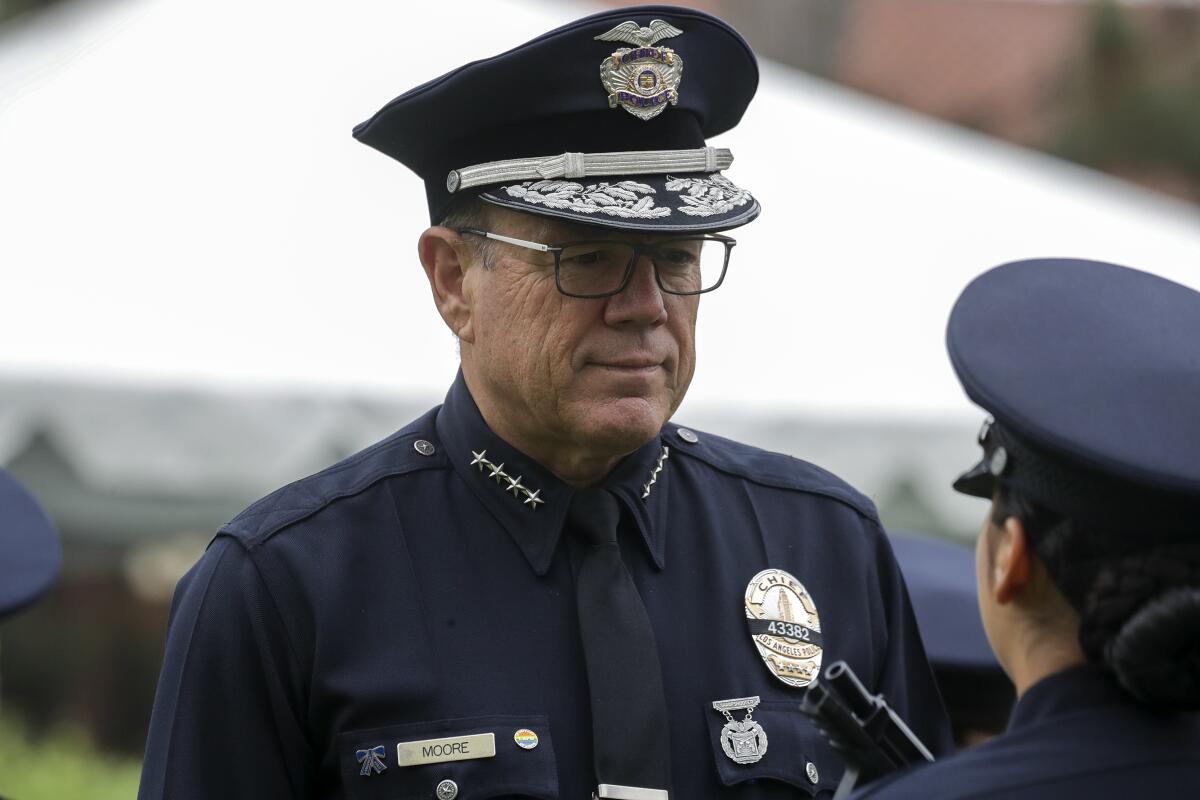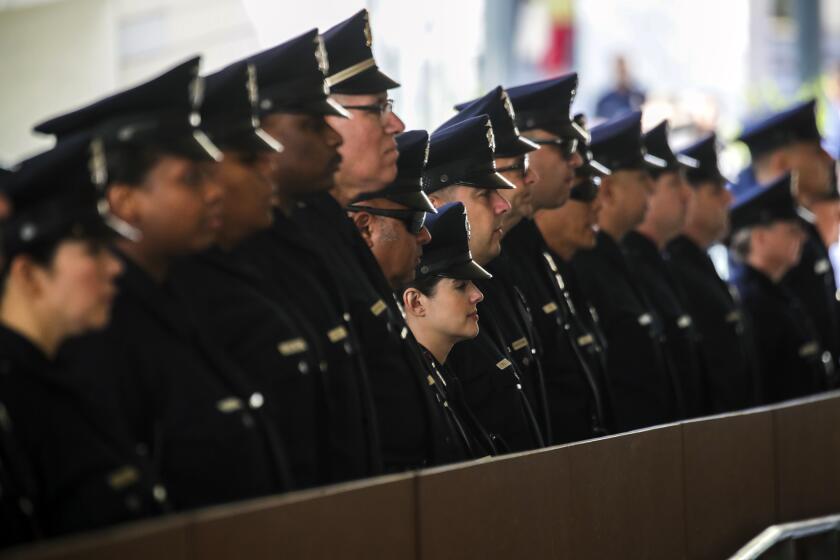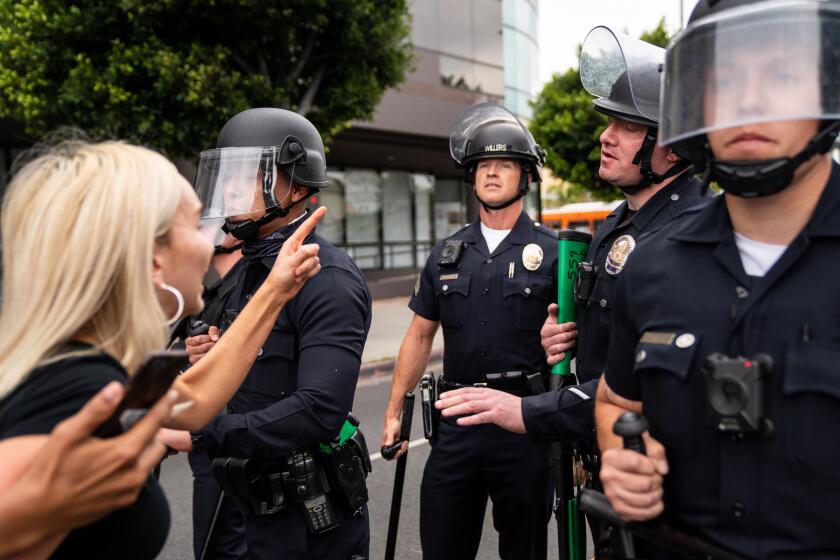Editorial: Don’t rush a decision on LAPD Chief Michel Moore’s reappointment

Reappointing, or declining to reappoint, Los Angeles police Chief Michel Moore may be the most consequential decision city leaders make. They should not move forward without serious fact-finding, consultation and deliberation. Moore put in his application for a second five-year term just after Christmas, and the Board of Police Commissioners now has up to three months (until the last week in March) to do its homework and make its decision. His current term runs through the last week of June. There’s no reason to rush.
So the public statement from commission President William Briggs II that the city and the department “will greatly benefit from [Moore’s] continued stewardship of a critical component of public safety,” and Briggs’ statement to a Times reporter that the commission would vote on Moore’s reappointment on Jan. 10, are precipitous, to say the least. They smack of a re-coronation notice, rather than the careful, public and open process the city needs.
Mayor Karen Bass has been in office less than a month, her transition team’s public safety subcommittee has yet to meet, and it’s not yet clear whether she intends to keep the five current police commissioners, all of whom were appointed by her predecessor, Eric Garcetti. They too each serve five-year terms, and are ostensibly independent, but as a practical matter they carry out the mayor’s public-safety policy objectives. We’ve barely heard those objectives and priorities yet — at least not from Bass’ perspective after she has enough time in office to gather the facts she needs to make such an important decision and share her thinking with the commissioners.
The LAPD’s Board of Rights hearings have long been the weak link in officer discipline. The City Council has another chance to fix the problem.
Bass currently has her hands full with Los Angeles’ overwhelming homelessness challenge, but in the end the two issues — housing people living on the streets and setting a course for the LAPD — are intertwined, because police officers are still the city’s front-line response to the unhoused.
Bass told The Times’ editorial board last week that she would soon share her public safety goals with Moore. She will have to lay them out for the rest of the city as well.
“I just am highly opinionated about it because I’ve worked on this issue for many, many, many years,” she said.
That’s certainly true. Bass was a community organizer for whom policing was a central concern before she entered politics, first in the California Assembly where she served as speaker and later as a member of Congress.
The reappointment process is not exactly convoluted but involves several steps calculated to prevent the chief’s job from becoming purely political — as it was in the early 20th century, when the LAPD was racked by corruption — while still preventing the virtual life tenure and unaccountability enjoyed by many chiefs up to the time of the civil unrest in 1992. Chiefs now can serve a maximum of two, five-year terms.
Since then, two chiefs — Willie Williams and Bernard Parks — were denied second terms. Two others — William J. Bratton and Charlie Beck — got second terms but stepped down before they were concluded. No chief has served two full terms.
The mayor has no formal role in reappointing the chief unless the board fails to act (unlike in the initial appointment, where the mayor selects from among candidates offered by the commission) but is generally seen as the decision-maker because under the charter the chief serves “at the pleasure of the city” and the commissioners carry out her policies. The City Council too can opt to step in.
L.A.’s law enforcement agencies are among the nation’s most “reformed,” but they still engage in excessive force and other misconduct.
Briggs’ statements raise all kinds of questions. Is a commission decision already made, in violation of the letter of open meeting laws and the spirit of transparency — the kind of transparency that Bass has said is essential to policing? Is Moore, if reappointed, planning to leave early, as Bratton and Beck did? Will the City Council get on board despite the sharp criticism of policing in general and the LAPD in particular aired during their recent election campaigns?
Several years ago, the council promised a citywide discussion of the LAPD focused on, but going beyond, officer accountability. But it didn’t deliver. In the last five years Los Angeles has seen upticks in violent crime, protests over police tactics, an increase in use of police force and the same debates over the role of policing taking place around the country even before the 2020 murder of George Floyd in Minneapolis.
Bass told the editorial board she intends to follow through on her vision for an Office of Community Safety that embraces a broader view of public safety services, including care and crime prevention delivered by service providers other than just the LAPD.
“It’s going to take me a minute, you know,” she said. “It’s not going to be one of the first or second things I do.”
It doesn’t have to be, and neither does a decision on Moore’s reappointment. But those things are related, and require decisions — thoughtful, considered, fact-and-values-based decisions.
More to Read
A cure for the common opinion
Get thought-provoking perspectives with our weekly newsletter.
You may occasionally receive promotional content from the Los Angeles Times.












